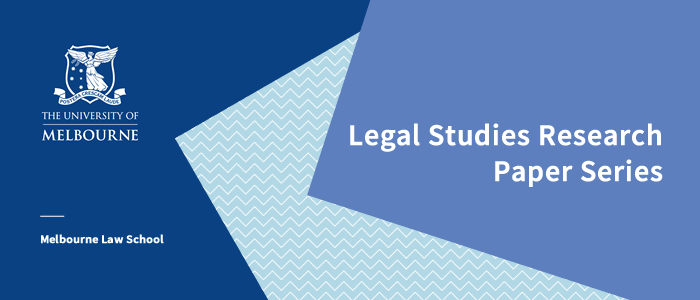Volume 22, No. 8
Wednesday, 28 October 2020

Melbourne Law School published Volume 22 Number 8 of the University of Melbourne Law School Legal Studies Research Paper Series on SSRN.
This issue includes the following articles:
Adrienne Stone and Frederick Schauer
Introduction to the Oxford Handbook on Freedom of Speech (905)
This is the introduction to the Oxford Handbook on freedom of speech and outlines the central themes of the chapters. The Handbook provides a comprehensive exploration of freedom of speech both as a political idea and as a legal principle. It is arranged in three parts: The chapters in Part I focus on freedom of speech as a political idea and upon the ideas and rationales that underlie it; the chapters in Part II focus on distinctive features of freedom of speech as a legal principle. In the final part of the Handbook, the chapters focus on a range of controversies that have arisen in constitutional systems throughout the world and which illustrate and elaborate upon the general themes of Parts I and II.
Farrah Ahmed
Arbitrariness, Subordination and Unequal Citizenship (906)
The Citizenship (Amendment) Act, 2019 is unconstitutional for a range of reasons including unlawful discrimination on the grounds of religion and origin, breach of constitutional protections of equal religious freedom and inconsistency with the secular commitments of the constitutional settlement. This paper will argue that the Act is unconstitutional for further, equally significant, reasons. The equality provisions of the Constitution, particularly Article 14, proscribe legislation that is arbitrary as well as legislation that subordinates. The Citizenship (Amendment Act) 2019 is unconstitutional because it is arbitrary and subordinating. The tests for arbitrariness and subordination are currently unclear. So after offering some background to the Act, this paper articulates a test for arbitrariness and subordination, and demonstrates how the Act is unconstitutional when measured against these tests.
Rosemary Teele Langford
Purpose-Based Governance: A New Paradigm (907)
The permissibility of corporations pursuing purposes other than profit has been the subject of debate for a number of years. This debate has intensified recently with proposals to allow or mandate the adoption of purposes by corporations. At the same time, purpose is central to governance in the charitable sphere. This article proposes a model of 'purpose-based governance', which offers significant potential advantages in both the charitable and for-profit spheres, as well as forming the basis of a unifying governance paradigm.
Rosemary Teele Langford
Use of the Corporate Form for Public Benefit - Revitalisation of Australian Corporations Law (908)
This article specifically addresses the theme of revitalisation of Australian law in the facilitation of purpose-based companies. It is the second of two articles on purpose-based governance in the charitable and for-profit spheres. Building on the first article, this article critically analyses relevant features of the Australian corporations law regime. It pays close attention to challenges relating to the application of directors’ duties where companies have multiple purposes and to the drafting of appropriate constitutional provisions. In so doing it draws on insights from overseas jurisdictions that have enacted legislation to enable purpose-based companies.
Tess Hardy
Trivial to Troubling: The Evolution of Enforcement under the Fair Work Act (909)
When the Fair Work Act 2009 (Cth) was first introduced, compliance issues were viewed as somewhat trifling and the enforcement framework generated very little discussion, let alone debate. Early reviews of the Office of the Fair Work Ombudsman (FWO) generally reached positive conclusions about the level of employer non-compliance and the FWO’s overall response. However, the tide turned in 2015 following the 7-Eleven underpayment scandal. Since this time, there has been, and continues to be, a sense that there is now an enforcement crisis. While the Fair Work Amendment (Protecting Vulnerable Workers) Act 2017 (Cth) introduced a number of far-reaching reforms, many believe more needs to be done. This article charts some of the most critical forces which have shaped compliance promotion and enforcement processes over the past 10 years and reflects on how this response may continue to evolve into the future.
Scott Stephenson
Against Interpretation as an Alternative to Invalidation (910)
This article evaluates the rise of interpretation as an alternative means of judicially enforcing legislative compliance with rights. Instead of the traditional method where courts are empowered to invalidate statutes that are found to be incompatible with rights, the alternative empowers courts to interpret statutes in a manner that renders them compatible with rights. It argues that interpretation emerged as an alternative to invalidation among both constitutional reformers and judges in Australia (and elsewhere) in the 1990s and 2000s because interpretation was seen as a way of addressing democratic concerns about rights-based judicial review and as a less confrontational method of resolving rights issues. The article puts forward an argument for invalidation over interpretation on the basis that interpretation’s comparative appeal is not particularly strong—there are alternative ways of addressing the democratic concerns, and the connection between invalidation and confrontation is weak—and that invalidation is a more transparent, and therefore accountable, exercise of public power than interpretation.